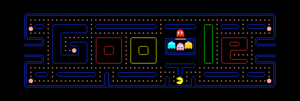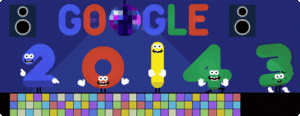Google Doodle facts for kids

A Google Doodle is a special, temporary alteration of the logo on Google's homepages intended to commemorate holidays, events, achievements, and historical figures. The first Google Doodle honored the 1998 edition of the long-running annual Burning Man event in Black Rock City, Nevada, and was designed by co-founders Larry Page and Sergey Brin to notify users of their absence in case the servers crashed. Early marketing employee Susan Wojcicki then spearheaded subsequent Doodles, including an alien landing on Google and additional custom logos for major holidays. Google Doodles were designed by an outside contractor, cartoonist Ian David Marsden until 2000, when Page and Brin asked public relations officer Dennis Hwang to design a logo for Bastille Day. Since then, a team of employees called Doodlers have organized and published the Doodles.
Initially, Doodles were neither animated nor hyperlinked—they were simply images with tooltips describing the subject or expressing a holiday greeting. Doodles increased in both frequency and complexity by the beginning of the 2010s. On October 31, 2000, the first animated Doodle celebrated Halloween. On May 21, 2010, the first interactive Doodle appeared later celebrating Pac-Man, and hyperlinks also began to be added to Doodles, usually linking to a search results page for the subject of the Doodle. By 2014, Google had published over 2,000 regional and international Doodles throughout its homepages, often featuring guest artists, musicians, and personalities. By 2019, the Doodlers team had created over 4,000 Doodles for Google's homepages around the world.
Contents
Overview
In addition to celebrating many well-known events and holidays, Google Doodles celebrate artists and scientists on their birthdays. The featuring of Lowell's logo design coincided with the launch of another Google product, Google Maps. Doodles are also used to depict major events at Google, such as the company's own anniversary. The celebration of historic events is another common topic of Google Doodles including a Lego brick design in celebration of the interlocking Lego block's 50th anniversary. Some Google Doodles are limited to Google's country-specific home pages while others appear globally.
Common themes
Since the first Thanksgiving Doodle in 1998, many Doodles for holidays, events and other celebrations have recurred annually. These include:
- Gregorian New Year's Day (2000 onwards)
- Martin Luther King Jr. Day (2003; 2006 onwards)
- Lunar New Year (2001; 2003 onwards)
- Valentine's Day (2000 onwards; partial exception during certain Olympic years)
- International Women's Day (2005; 2009 onwards)
- Saint Patrick's Day (2000–2021; 2023 onwards)
- Earth Day (2001 onwards)
- Mother's Day (2000 onwards)
- Father's Day (2000 onwards)
- Juneteenth (2020 onwards)
- U.S. Independence Day (2000 onwards)
- Bastille Day (2000 onwards)
- German Unity Day (2002–2003; 2006–2008; 2010 onwards)
- Swiss National Day (2001 onwards)
- Olympic Games (2000 onwards; partial exception in 2014)
- Halloween (1999 onwards)
- Hinamatsuri (2009–2012; 2014 onwards)
- U.S. Thanksgiving Day (1998 onwards)
- Christmas Day (1999 onwards)
- New Year's Eve (1999; 2011 onwards)
Doodlers
Doodlers is Google's name for the illustrators, engineers and artists who design the Doodles. They have included artists like Ekua Holmes, Jennifer Hom, Sophia Foster-Dimino, Ranganath Krishnamani, Dennis Hwang, Olivia Fields, Nate Swinehart, Lynnette Haozous, and Eric Carle.
Interactive and notable doodles

In May 2010, on the 30th anniversary of the 1980 arcade game Pac-Man, Google unveiled worldwide their first interactive logo, created in association with Namco. Anyone who visited Google could play Pac-Man on the logo, which featured the letters of the word Google on the Pac-Man maze. The logo also mimicked the sounds the original arcade game made. The I'm Feeling Lucky button was replaced with an Insert Coin button. Pressing this once enabled the user to play the Pac-Man logo. Pressing it once more added a second player, Ms. Pac-Man, enabling two players to play at once, controlled using the W, A, S, D keys, instead of the arrows as used by Player 1. Pressing it for a third time performed an I'm Feeling Lucky search. It was then removed on May 23, 2010, initially replacing Pac-Man with the normal logo. Later on that day, Google released a permanent site to play Google Pac-Man (accessed by clicking on top icon), due to the popular user demand for the playable logo. Pac-Man Doodle drew an estimated 1 billion players worldwide.
Common themes

Since Google first celebrated the Thanksgiving holiday with a Doodle in 1998, many Doodles for holidays, events, and other celebrations have recurred on an annual basis, including the following:
- Gregorian New Year (2000–present)
- Martin Luther King, Jr. Day (2003; 2006–present)
- Lunar New Year (2001; 2003–present)
- Valentine's Day (2000–present; partial exception during certain Olympic years)
- International Women's Day (2005; 2009–present)
- Saint Patrick's Day (2000–2002; 2004–present)
- Earth Day (2001–present)
- Mother's Day (2000–present)
- Father's Day (2000–present)
- U.S. Independence Day (2000–present)
- Bastille Day (2000–present)
- Olympic Games (2000–present; partial exception in 2014)
- Halloween (1999–present)
- U.S. Thanksgiving Day (1998–present)
- Christmas (1999–present)
- New Year's Eve (2010–present)
"Doodle 4 Google" competitions
Google holds competitions for school students to create their own Google doodles, referred to as Doodle 4 Google. Winning doodles go onto the Doodle4Google website, where the public can vote for the winner, who wins a trip to the Googleplex and the hosting of the winning doodle for 24 hours on the Google website.
The competition originated in the United Kingdom, and has since expanded to the United States and other countries. The competition was also held in Ireland in 2008. Google announced a Doodle 4 Google competition for India in 2009 and the winning doodle was displayed on the Google India homepage on November 14. A similar competition held in Singapore based on the theme "Our Singapore" was launched in January 2010 and the winning entry was chosen from over 30,000 entries received. The winning design was shown on Singapore's National Day on Google Singapore's homepage. It was held again in 2015 in Singapore and was themed 'Singapore: The next 50 years'.
See also
 In Spanish: Doodle de Google para niños
In Spanish: Doodle de Google para niños


